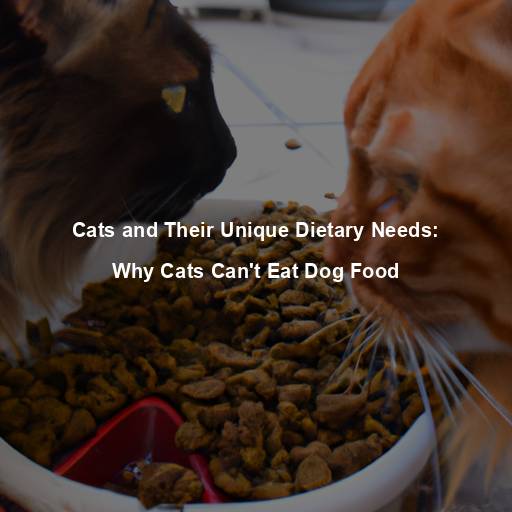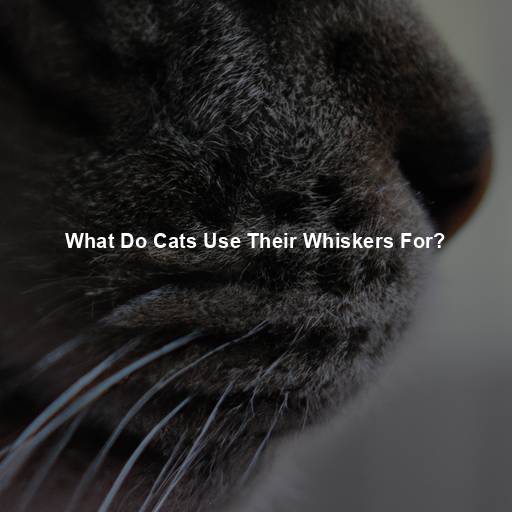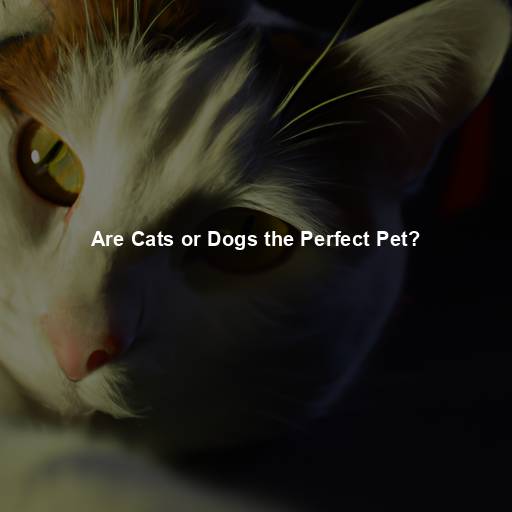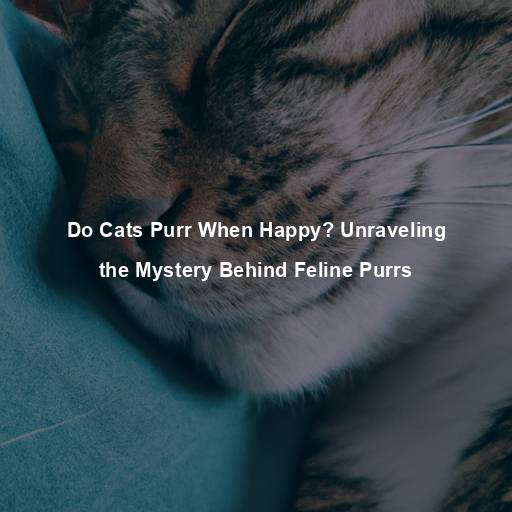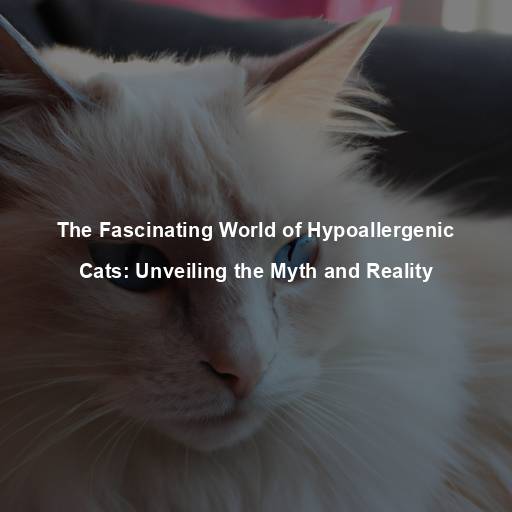Cats and Their Unique Dietary Needs: Why Cats Can’t Eat Dog Food
Last Updated on October 28, 2023 by Evan
Contents
Understanding Cats’ Nutritional Requirements
There is an enchanting allure surrounding cats, captivating us with their enigmatic ways. Their dietary needs, oh how intricately unique they are! As true carnivores, their bodies have undergone a remarkable evolution, demanding a culinary feast predominantly composed of animal protein and fats. Dogs and humans may share the world with them, yet we must acknowledge the cats’ extraordinary nutrient prerequisites, crucial for their vitality and well-being.
The Importance of Taurine
When it comes to cats’ health, one nutrient takes the spotlight: taurine, an amino acid with countless benefits for their bodies. From promoting clear vision to supporting a strong heart and bolstering the immune system, taurine is a true superhero. Interestingly, unlike their canine counterparts, cats can’t produce enough taurine internally, making it crucial for them to get their fix from their diet. It’s amazing how nature has its own way of balancing the scales for these fascinating creatures.
The Role of Arachidonic Acid
Just like humans need certain essential nutrients to function properly, cats have specific dietary requirements as well. One such vital element for feline health is arachidonic acid, an omega-6 fatty acid. This particular nutrient plays a perplexingly crucial role in various aspects of a cat’s well-being, including the normal functioning of their cells, maintaining a lustrous coat, healthy skin, and reproductive health. Interestingly, unlike their canine counterparts who can produce arachidonic acid from other fatty acids, cats are left perplexed as they lack this ability and must instead obtain it directly from their diet.
Unique Protein and Fat Requirements
Cats have a higher protein requirement compared to many other animals. Protein provides the necessary building blocks for muscle development, tissue repair, and overall growth. Additionally, cats require a higher dietary fat intake as it serves as a concentrated source of energy and aids in the absorption of fat-soluble vitamins.
The Dangers of Feeding Cats Dog Food
Although cats and dogs often form strong companionships, it is essential to recognize that their nutritional requirements deviate substantially. Introducing cat owners to the potential hazards of feeding their feline friends dog food is crucial. By delving into these risks, we can shed light on the perplexing dangers that await cats who consume a diet designed for canines.
Inadequate Taurine Levels
Cats, those enigmatic creatures who grace our homes with their presence, possess a unique dietary requirement – taurine. This vital nutrient, essential for their well-being, can prove elusive when cats venture into the realm of dog food. You see, dear reader, while dog food may satisfy the woofers of this world, it falls short in meeting the needs of our feline friends. And thus, an ominous truth emerges – prolonged deprivation of taurine may unleash a cacophony of health problems upon these bewildering beings – heart maladies, reproductive challenges, and a weakened immune fortress.
Insufficient Arachidonic Acid
Similarly, dog food lacks the necessary levels of arachidonic acid that cats need. Without adequate arachidonic acid intake, cats may experience skin and coat problems, reproductive issues, and impaired growth and development.
Imbalance in Protein and Fat Content
Did you know that our feline friends have a special dietary need for protein? It turns out that cats are experts at breaking down animal protein, which means they need higher levels of it in their diet. While dog food might contain lower levels of protein, this can spell trouble for cats, leading to things like muscle wasting and overall poor health. And let’s not forget about the importance of fat in cat food, which helps provide the energy they need and supports their body functions.
Lack of Essential Nutrients
Feeding our feline friends requires more than just any old grub. When it comes to their chow, we need to be clued in on a few feline-specific factors. From the distinct dose of taurine, arachidonic acid, protein, and fat to the carefully concocted cocktail of vitamins A, D, and various minerals, cat food has it all covered. Don’t be fooled into thinking that dog food can cut it for our purring companions – it might leave them malnourished and grappling with potential health woes down the line.
Meeting Cats’ Unique Nutritional Needs
When it comes to nourishing our beloved furry friends, it’s vital to prioritize their overall vitality and happiness. Opting for a diet that is both balanced and tailored specifically to their unique feline needs will undoubtedly lead to optimal health outcomes. To assist you in this quest, we have compiled a list of crucial factors to bear in mind when selecting the purrfect cat food for your beloved companions. Let’s delve into this perplexing yet vital topic together, ensuring that your feline friends are bursting with energy and thriving every step of the way.
Choose High-Quality, Complete and Balanced Cat Food
When it comes to our feline friends‘ dietary needs, it’s crucial to choose cat food that caters to their unique nutritional requirements. Go for the options specially designed to meet those needs, providing the essential proteins, fats, vitamins, and minerals they need to thrive. Keep an eye out for labels that proudly boast of being “complete and balanced,” guaranteeing a well-rounded diet for your furry companions’ optimal well-being.
Read the Ingredients List
When selecting cat food, carefully read the ingredients list. Look for named animal protein sources, such as chicken, beef, or fish, listed as the primary ingredients. Avoid products that contain excessive fillers, artificial additives, or by-products.
Consult with a Veterinarian
If you have any concerns or questions about your cat’s diet, consult with a veterinarian. They can provide you with expert advice tailored to your cat’s specific needs, considering factors such as age, weight, and any underlying health conditions.
Consider a Raw or Homemade Diet
For cat lovers seeking to nourish their furry friends in a more personalized and au naturel manner, the allure of a raw or homemade diet holds undeniable appeal. However, embarking upon this culinary adventure warrants judicious deliberation and expert guidance from a trusted veterinarian or veterinary nutritionist. By curating a bespoke meal plan that caters to their cats’ distinctive nutritional needs, these intrepid pet parents (with bouquets of caution in hand) embrace a path less traveled, venturing into the realm of bespoke feline sustenance.
Malnutrition and Weight Issues
Ensuring proper nutrition for our feline friends is vital, as neglecting their dietary needs may plunge them into the abyss of malnutrition, resulting in distressing consequences like dwindling weight, feeble muscle tone, and a vulnerable immune system. However, one must be cautious not to fall into the pitfall of feeding cats dog food, as this might catapult our beloved pets into the realm of plumpness and obesity, carrying its own labyrinthine maze of health hazards. Striking the right equilibrium in their diet can be quite perplexing, but it is crucial for their overall well-being.
Digestive Problems
Cats, being the fascinating creatures they are, possess quite the intricate digestive system that craves a delectable feast of animal proteins and fats. Steering clear of dog food, which tends to harbor more grains or plant-based components, becomes imperative to prevent distressing digestive woes like unwelcome episodes of diarrhea, spurts of vomiting, and perhaps even the unnerving inflammatory bowel disease (IBD). Catering to their peculiar digestive physiology stands paramount in ensuring their well-being and vitality.
Dental Health Concerns
In addition to their dietary requirements, cats also have specific dental needs. Chewing dry kibble can help maintain their dental health by reducing plaque and tartar buildup. Dog food, which is often formulated into larger, less crunchy pieces, may not provide the same dental benefits for cats. Poor dental health can lead to periodontal disease and other oral health problems.
Urinary Tract Health
When it comes to our feline friends, we need to be aware of the potential challenges they might face, particularly in their urinary health. Cats can encounter issues like urinary crystals or stones, and what they eat can have a profound impact on their well-being. That’s why cat food is carefully crafted to promote a favorable pH balance in their urine, ensuring a healthy urinary tract. However, it’s crucial to steer clear of feeding them dog food, as it lacks the specific urinary support they require, ultimately raising the risk of urinary tract problems.
Understanding the Differences Between Cats and Dogs
The feline digestive system is designed to process a high-protein, low-carbohydrate diet, whereas canines have a more flexible metabolism that can handle a wider array of nutrients. This divergence in dietary requirements means that cat food is formulated specifically to meet the nutritional needs of felines, containing essential amino acids like taurine, which is vital for their overall health. On the other hand, dog food is formulated with different proportions of nutrients to meet the needs of dogs, including higher levels of carbohydrates to fulfill their energy requirements. Therefore, feeding a cat dog food could lead to nutrient deficiencies that can have adverse effects on their well-being.
Carnivorous vs. Omnivorous Diets
Cats are obligate carnivores, meaning their bodies have adapted to thrive on a diet primarily composed of animal tissue. Dogs, on the other hand, are considered omnivores, as they can digest and utilize a more varied diet that includes both plant and animal matter. These differences influence their nutritional requirements and the way their bodies process and metabolize nutrients.
Protein and Amino Acid Needs
When it comes to furry nutrition, cats really take the cake in the protein department. These majestic creatures have a voracious need for this essential macronutrient, as it provides them with those oh-so-important amino acids that keep their bodies purring along. Unlike their canine counterparts, cats aren’t exactly thrill-seekers when it comes to plant-based proteins – they require the real deal, straight from the animal kingdom, to satisfy their complex dietary needs.
Essential Nutrients
Cats have specific dietary requirements for certain nutrients that are different from dogs. For example, cats need to consume pre-formed vitamin A, as they cannot efficiently convert plant-based sources of beta-carotene into this essential vitamin. Dogs, on the other hand, have the ability to convert beta-carotene into vitamin A. These differences highlight the need for tailored nutrition for each species.
Metabolism and Energy Needs
It’s no secret that cats are lively creatures, always on the move and exploring their surroundings. But did you know that their active lifestyles come with a higher metabolic rate than their canine counterparts? That’s right – these furry felines need a diet that can keep up with their burst of energy. Enter cat food, specially formulated with a higher fat content to provide the necessary calories for their daily adventures.
Providing Optimal Nutrition for Cats
To ensure that cats receive the nutrition they need, it’s important to choose cat food that is specifically formulated to meet their unique dietary requirements. Here are some additional tips for providing optimal nutrition for your feline companion:
Wet vs. Dry Cat Food
Choosing between wet and dry cat food can be a perplexing dilemma for cat owners. The burst of hydration offered by wet food is a tempting advantage, especially for furballs battling urinary tract issues. However, the dental benefits of dry cat food cannot be disregarded, leaving pet parents in a state of befuddlement. Luckily, a balanced approach of incorporating both wet and dry options can help navigate this puzzling decision, providing feline friends with the best of both worlds.
Age-Appropriate Diets
As our adorable feline friends journey through the cycles of life, their dietary requirements evolve in tandem. As mischievous kittens strut into their youth, their voracious appetites call for an exuberant blend of proteins and calories to fuel their rapid growth. Once adulthood graces their majestic presence, a harmonious balance of nutrients becomes crucial to sustain their overall well-being. The wizened senior cats, with their wisdom etched in their gaze, may find solace in specialized diets that cater to their mature bodies, tenderly tending to age-related concerns like joint vitality and managing their weight with utmost dedication.
Avoid Feeding Human Food
While it may be tempting to share our meals with our feline friends, it’s essential to avoid feeding them human food. Many human foods, such as onions, garlic, chocolate, and caffeine, can be toxic to cats. Stick to cat-specific food options to ensure their safety and well-being.
Regular Veterinary Check-ups
Regular visits to the veterinarian are crucial for monitoring your cat’s overall health and nutritional status. A veterinarian can provide guidance on selecting the right diet, address any concerns or questions, and detect any nutritional deficiencies or health issues early on.
FAQs – Why Cats Can’t Eat Dog Food
Can cats eat dog food?
It’s a common question among pet owners: can cats indulge in a bowl of dog food? While both feline and canine pals share a love for meaty goodness, their nutritional demands bloom distinctively. Cats, being the finicky connoisseurs they are, require specific nutrients like taurine, arachidonic acid, and vitamin A to keep their whiskers wagging. Unfortunately, dog food just doesn’t offer the purr-fect blend of these essential elements, leaving our feline friends paw-tifully perplexed in the realm of dietary compatibility. So, let’s keep the bowls separate and embrace the diverse nutritional tapestry these precious furballs crave!
What happens if a cat eats dog food?
If a cat eats dog food occasionally or in small quantities, it is unlikely to cause immediate harm. However, consistently feeding a cat dog food can result in nutritional imbalances, leading to health issues over time. A diet lacking essential nutrients like taurine can cause serious problems in cats, affecting their heart, vision, and reproductive system. Additionally, dog food may contain certain ingredients that are higher in carbohydrates and lower in proteins, which can be detrimental to a cat’s health in the long run.
Can dog food be harmful to cats?
While it might seem tempting to offer your feline friend a taste of your pup’s dinner, it’s important to tread cautiously when it comes to cross-species dining. Dog food, while suitable for our canine companions, falls short in meeting the unique nutritional needs of cats. Regular or excessive consumption of dog food by cats can lead to a myriad of health issues caused by nutrient imbalances. To safeguard your furry friend’s wellbeing and prevent any unexpected pawstacles, it’s crucial to opt for a well-rounded, tailored diet that caters specifically to their species’ requirements.
Why is taurine important for cats?
Taurine, an essential amino acid, holds tremendous importance in the well-being of our feline friends. Cats, unlike their canine counterparts, cannot synthesize taurine in adequate amounts naturally. This compound plays a pivotal role in their cardiovascular health, visual acuity, digestive processes, and fortification of their immune system. Neglecting their heightened demand for taurine can have severe repercussions, such as feline central retinal degeneration and dilated cardiomyopathy. Therefore, it becomes imperative to diligently feed our beloved cats a specialized diet that fulfills their unique dietary needs.
When it comes to our furry companions, it’s tempting to simplify things and just toss them the same chow. But here’s the kicker: cats and dogs have unique taste buds and nutritional needs. Feeding these four-legged munchers the same grub all the time can throw their health for a loop and have us scratching our heads when something goes awry. So, here’s the inside scoop: opt for specially tailored chow for cats and dogs to keep them in tip-top shape and out of the vet’s waiting room. Trust me, their tummies will thank you!

